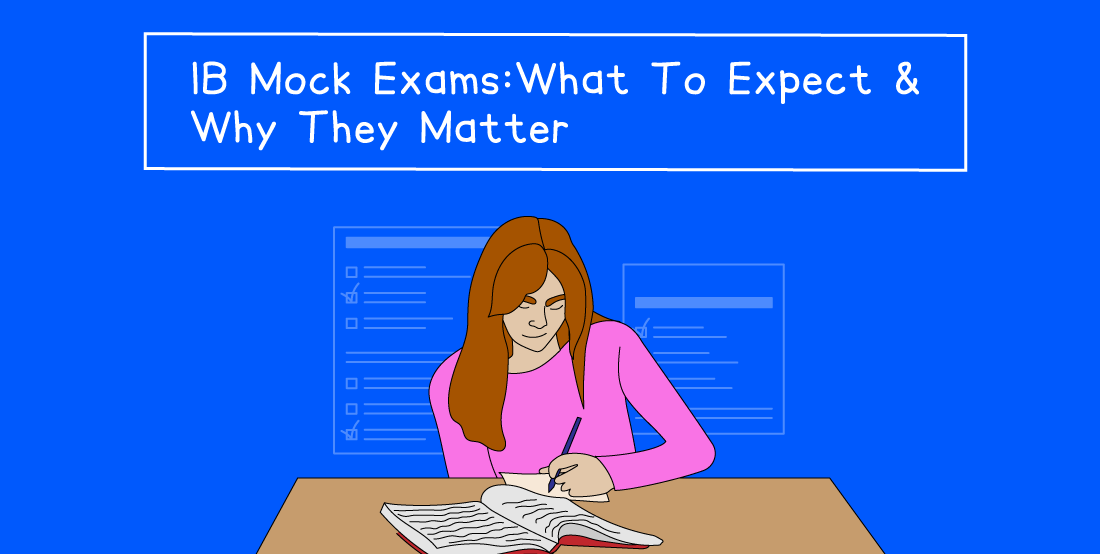IB Mock Exams: What To Expect & Why They Matter
Written by: Holly Barrow
Reviewed by: Liam Taft
Published

Contents
What are IB mock exams?
As you progress through the IB Diploma Programme (DP), one of the most important milestones ahead of your final exams is the mock exam period.
These practice exams are set by your teachers to closely mirror the actual IB exams and give you a realistic idea of what to expect. They're a powerful tool for gauging your current progress and identifying areas to improve.
IB mocks usually take place midway through your second year (IB2), though some schools also hold mocks in IB1.
They typically consist of past IB questions and follow the format, timing and difficulty of the real exams. For instance, if you're sitting IB Chemistry HL Paper 2, your mock will reflect its structure. This means you’ll have 2 hours 30 minutes to complete it, it will be worth 90 marks, and it will include a mix of structured and extended-response questions.
If you're gearing up for your IB mocks, using practice papers and mark schemes is a great way to revise. And with Save My Exams’ new Mock Exams feature, you can try full-length mock papers written by experienced teachers and examiners. Try one of our IB Chemistry mocks at home to monitor your progress.
Why are IB mock exams so important?
1. Real exam experience under timed conditions
Think of your IB mocks as a rehearsal for the real thing. They give you the chance to practise answering exam-style questions under the same time constraints you'll face in April and May.
IB exams often last up to two hours per paper (if not longer) and demand critical thinking under pressure, so it’s useful to get into the habit of sitting these exams before the real deal.
Some students struggle with prolonged periods of concentration, so experiencing this in advance and tweaking your approach to exams can be invaluable.
You might find that stopping to have a drink of water every 30 minutes acts as a bit of a mental reset and helps you to focus–whatever it is, it’s good to know ahead of time what works for you.
Taking mocks also helps to reduce exam anxiety. You'll develop a feel for pacing and the kind of precision the IB expects in your answers.
2. A clear picture of strengths and weaknesses
Mock exams provide one of the most accurate snapshots of your current performance. They show how well you’re applying knowledge across different paper styles—not just how well you’ve memorised content.
Falling below your target grade isn’t the end of the world. Instead of seeing this as a negative, allow your results to shape your revision strategy and tackle weaker areas head-on.
3. Mocks impact predicted grades
Your IB mock results are often a key factor in determining predicted grades, which are sent to colleges and universities as part of your application.
In rare circumstances—like illness or exam cancellations—mock results could contribute to final awarded grades, especially as part of internal assessments or teacher evaluations. So it’s worth giving them your full attention.
Want a clearer picture of how you’re currently doing? You can practise full-length IB mocks at home and get a baseline grade estimate with Save My Exams’ new Mock Exams feature. This can help you to track your progress and see where you stand.
How to prepare for your IB mock exams
1. Know your syllabus inside out
Each IB subject has a detailed syllabus outlining the topics, skills and assessment objectives. Use this as a checklist to make sure you're covering everything that might come up in both your mocks and the real exams.
Pay close attention to the command terms used in each subject—they’re crucial for understanding exactly what’s being asked.
2. Create a structured revision timetable
The IB DP is demanding, meaning time management is key. Before mocks, break each subject into smaller topics and spread your revision over several weeks. Refer to the syllabus as you do this to ensure you’re hitting all the key areas.
Factor in your class schedule, extracurriculars and energy levels. For example, if you study best in the mornings, prioritise trickier subjects then. Regular, consistent revision is more effective than last-minute cramming.
Don’t forget to include breaks and downtime to avoid burnout!
3. Mix up your revision methods
Passive revision techniques like rereading through your notes aren’t the most effective. Use active strategies that help you retain information and apply it under pressure. For example:
Use flashcards for definitions, dates and theories
Try past paper questions and mark them using IB mark schemes
Try mock exams from home
Write essay plans or timed short-answer responses
Answer exam-style questions
4. Try out different study techniques
Explore tried-and-tested revision techniques like spaced repetition, active recall or the Pomodoro method to improve focus and retention. Now is the time to experiment and find what works best for your learning style.
Check out our helpful IB revision tips and advice over on our Learning Hub.
Here are some specific articles that might help you:
Do IB mocks affect your final grades?
Not directly. IB mock results don’t count toward your final IB Diploma score. However, they do carry a lot of weight when it comes to:
Predicted grades for college/university applications
Teacher insight into your progress
Evidence in the event of exceptional circumstances (e.g. illness)
They’re also a great opportunity to refine your technique and focus your revision in the months leading up to your real exams.
What happens after IB mocks?
Once you’ve completed your mock exams, your teachers will return them to you with detailed feedback. Don’t just skim over the marks—take time to understand your mistakes, ask questions and take some learnings from them.
Use the feedback to shape your revision strategy. Improving exam technique is just as important as learning the content.
Frequently Asked Questions
Are IB mocks harder than real exams?
They’re usually just as difficult, since they use real past paper questions. However, the range of topics may be narrower, especially if your class hasn’t yet completed the full syllabus.
If certain content hasn’t been covered yet, your teacher might adapt the paper or take that into account during marking.
When are IB mock exams held?
Most schools hold mock exams in the second year of IB (IB2), typically around January, just a few months before the real exams. Some also hold IB1 mocks at the end of the year to assess progress.
No matter when they’re scheduled, it’s important to treat them seriously—they’re a core part of your preparation for the real exams.
What if I fail my mock exams?
Mock exams are a learning opportunity, not a final verdict. Struggling in mocks just highlights what needs more attention. The key is how you respond—adjust your revision, seek support, and aim to improve next time.
That said, mocks are used to inform predicted grades, which are important for university applications. A poor mock result doesn’t seal your fate, but improving it in later assessments can help raise your predicted score.
How much should I revise for mock exams?
Focus on quality over quantity. Aiming for 2–4 hours of focused study a day is a good starting point. Use active revision methods like:
Teaching the material to someone else
Practising with timed papers
Creating visual notes or diagrams
Tailor your revision around your own energy levels and schedule, and focus on areas that will have the biggest impact.
What happens if I miss a mock exam?
If you miss a mock IB exam, let your teacher know as soon as possible. Depending on your school’s policy, you may be allowed to take it later—especially if you were ill or had a legitimate reason.
Missing a mock can affect your predicted grade, so it’s important that you sit them where possible. You’ll also lose a valuable chance to practise under exam conditions.
Ace your IB mocks with Save My Exams
Want to try full-length IB mock exams at home? Practice makes perfect, and with our new Mock Exams feature, you can put your knowledge to the test like never before.
Complete our mock exam papers under real exam conditions to gauge where you currently stand. This is perfect for building confidence and timing skills before the big day.
You’ll also get instant feedback on your answers thanks to our Smart Mark tool for selected IB courses.
Save My Exams is your go-to resource for IB revision. Our expert teachers and examiners have created high-quality revision notes, exam-style questions, flashcards and more – each tailored to your specific exam board. They cover everything you need to know so you can focus on what really matters.
Sign up for articles sent directly to your inbox
Receive news, articles and guides directly from our team of experts.

Share this article


 written revision resources that improve your
written revision resources that improve your